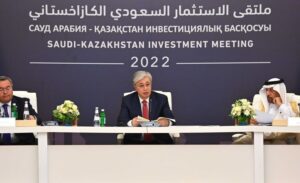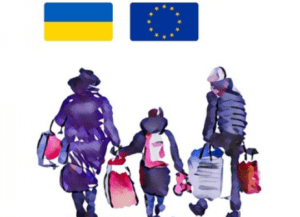
The agricultural sector of Kazakhstan has great potential and can become one of the long-term suppliers of high-quality wheat and oilseeds to Saudi Arabia, President of the Republic Kassym-Jomart Tokayev said.
“Kazakhstan ranks second in the world in terms of arable land per capita and fifth in terms of pasture resources (180 million hectares). Our country is one of the 10 largest producers of wheat and flour. We are ready to become one of the stable, long-term suppliers of high-quality wheat, flour and oilseeds to the kingdom,” Tokayev said, speaking at an investment round table with representatives of the business community of Saudi Arabia on Sunday in Jeddah.
KAZAKHSTAN, OILSEEDS, SAUDI ARABIA, SUPPLIER, Tokayev, WHEAT

As of July 20, 2022, the number of refugees from Ukraine registered for temporary protection or similar national protection schemes in Europe was 3,709.33 thousand, the Office of the United Nations High Commissioner for Refugees (UNHCR) reported on your site.
In the three weeks since June 29, the growth amounted to about 135 thousand, while in the previous two weeks – 170 thousand, and since the end of May – about 775 thousand.
Poland (about 40 thousand), Czech Republic (about 13.5 thousand), Great Britain (about 13 thousand) and Italy (about 11 thousand) showed the largest increase.
According to UNHCR data collected from national governments, the largest number of refugees with temporary protection status in Poland is 1 million 234.7 thousand, while 4.968 million people arrived in the country from Ukraine, according to the Polish border service, from the beginning of the war to , and in the opposite direction departed to Ukraine 3.045 million.
Following are Germany and the Czech Republic, where the number of refugees registered for temporary protection from Ukraine amounted to 670 thousand respectively (the data does not change from June 21) and 396.18 thousand.
The UN, referring to government data, indicates that in total in Germany, where Ukrainians are allowed to stay without registration until the end of August, 893 thousand refugees from Ukraine were recorded. Based on the data presented, a significant proportion of them have not yet applied for temporary protection status in that country.
In the Czech Republic, the situation, according to UN information, is different: almost all arrivals applied for protection status – 396.18 thousand out of 396.33 thousand.
In the vast majority of other countries, the picture is similar to the Czech Republic: the statistics of registered refugees is completely or almost equal to the statistics of those who applied for protection status, which is probably due to the peculiarity of their registration and the completion of the 90-day period of stay under the visa-free regime. An exception, similar to Germany, is only Romania – 45.53 thousand with the status of 84.53 thousand refugees recorded in the country and Estonia – 30.29 thousand out of 46.73 thousand.
Italy is still in fourth place in terms of the number of registered refugees from Ukraine – 143.13 thousand, and Spain closes the top five, in which the number of registered refugees increased by 5 thousand in three weeks, to 128.89 thousand.
Bulgaria follows with an indicator of 123.36 thousand, the only one in which the number of registered with the status of temporary protection is much higher than the number of registered refugees from Ukraine – 86.58 thousand.
More than 50 thousand refugees from Ukraine with the status of temporary protection are also in the UK – 99.7 thousand, France (data as of July 4) – 92.16 thousand (an increase of 4.2 thousand), Slovakia – 85.77 thousand (growth by more than 6 thousand).
Among these countries are also Austria – 76.21 thousand, the Netherlands (data as of July 5) – 68.05 thousand, Lithuania – 59.47 thousand, Switzerland – 57.02 thousand and Belgium – 51.12 thousand.
Following are Portugal – 47.75 thousand, Ireland – 44.58 thousand (an increase of 4.2 thousand), Belgium – 48.38 thousand, Sweden – 40.45 thousand, Latvia – 35.80 thousand. , Finland – 32.67 thousand, Denmark – 29.83 thousand and Hungary – 26.93 thousand, as well as the above-mentioned Romania and Estonia.
From 10 to 25 thousand refugees from Ukraine with the status of temporary protection in Norway – 21.06 thousand, Greece – 16.80 thousand, Croatia – 16.09 thousand and Cyprus – 14.37 thousand.
The UN also indicated the countries in which refugees from Ukraine were recorded, but there is no data on their status: Turkey (data as of May 19) – 145 thousand, Moldova – 86.24 thousand, Georgia – 23.11 thousand, Azerbaijan – 4.80 thousand, Albania – 2.50 thousand, North Macedonia – 1.64 thousand, Armenia – 0.49 thousand and Bosnia and Herzegovina – 0.30 thousand. Separately, it is worth specifying Russia and Belarus, the Ukrainian border with which, respectively, 1 million 745.80 thousand and 16.68 thousand people crossed. The UN information indicates that in the Russian Federation all those who crossed the border were recorded, while in Belarus – 10.35 thousand. There is no data on obtaining the status by them, as well as data on crossing the border of Ukraine in the opposite direction.
In total, according to the UN as of July 19, 9.567 million people left Ukraine since the beginning of the war, while 3.793 million returned (without data from Hungary, the Russian Federation and Belarus). According to this information, the total number of refugees since the beginning of the war can be estimated at about 5 4-5.5 million people, including about 1.75 million people to Russia.
“Since the beginning of the Russian invasion, almost a third of Ukrainians have been forced to flee their homes. This is the largest displacement crisis in the world to date. In Ukraine, more than 6.3 million people remain displaced by the war,” UNHCR points out, although an estimate three weeks ago internally displaced persons (IDPs) in Ukraine was higher – 7.1 million.

Agroholding MHP, the largest producer of chicken meat in Ukraine, in June 2022 slightly changed its economic activity compared to May of this year, reducing chicken production by 2% to 56.8 thousand tons, but increasing its sales by 4 % – up to 55.7 thousand tons, the holding reported on the London Stock Exchange on Friday.
It is noted that the agrarian group’s operating activity is still below last year’s figures due to the full-scale Russian invasion of Ukraine: in June 2022, chicken production was 89% of June 2021, and its sales were 82%, respectively.
It is specified that in the domestic market in June 2022, chicken sales remained at the level of June 2021 – 25.59 thousand tons, which is 12% less than the volumes sold in Ukraine in May 2022. In June of this year, chicken exports decreased by 29% compared to June 2021 – to 30.1 thousand tons, but exceeded the figures of the previous month by 24%.
Thus, the share of chicken exports in June of this year decreased by 9 percentage points (pp) compared to June 2021, to 54% from 63%, but increased by 9 percentage points. compared to last month.
The average selling price of poultry meat in June increased by 19% year-on-year to $2.0/kg.
During the specified period, MHP also reduced the production of meat products and semi-finished products by 46% compared to June 2021 – to 2.42 thousand tons, but increased by a third compared to May 2022.
According to him, in June 2022, sales of sunflower oil increased by 2.2 times compared to June last year and 2.6 times compared to May of the current year – up to 22.5 thousand tons. At the same time, sales of soybean oil increased by 15% by June 2021 and 3.6 times by May 2022 – up to 4.04 thousand tons.
“Harvesting of winter crops (wheat, barley and rapeseed) has already begun and is on schedule. Spring crops are in good condition. The weather conditions are also good,” the agricultural holding states in an exchange message.
MHP is the largest chicken producer in Ukraine. It is also engaged in the production of cereals, sunflower oil, meat processing products. On the European market, MHP supplies chilled half-carcasses of chickens, which are processed, including at its enterprises in the Netherlands and Slovakia. In February 2019, the agricultural holding completed the acquisition of the Slovenian company Perutnina Ptuj.
MHP generated $393 million in net profit in 2021 against a net loss of $133 million in 2020, while its revenue grew by 25% to $2.37 billion.
The founder, majority shareholder and head of the board of MHP is Ukrainian businessman Yuriy Kosyuk.

Ukraine reduced the export of semi-finished products from carbon steel in quantity terms by 60.8% in January-June this year compared to the same period last year, to 1.427 million tonnes.
According to statistics released by the State Customs Service, in monetary terms, exports of carbon steel semi-finished products over this period decreased by 54.1%, to $900.84 million.
The products were mainly exported to Bulgaria (21.38% of supplies in monetary terms), Italy (15.59%) and Turkey (11.87%).
In addition, Ukraine imported 5,530 tonnes of such products in January-June, which is 47.2% less than in January-June 2021. In monetary terms, imports decreased by 45.2%, to $3.53 million. The products were mainly imported from the Russian Federation (99.72% of supplies) and China (0.25%).

The Ukrainian Sea Ports Administration (USPA) reports on the ongoing preparation of the ports of Odessa, Chornomorsk and Yuzhny for the resumption of work in connection with the signing on July 22 in Istanbul of the Initiative for the export of grain and related food products by sea.
“Considering the above, we inform you that the event and the exit of ships to the indicated seaports will be carried out by forming a caravan, which will be accompanied by a leading ship,” the USPA posted on Facebook on Saturday.
In order to draw up plans for the formation of caravans, USPA asks to submit applications for the inclusion of ships by e-mail.
During the signing of the Initiative and immediately after it, Turkish President Recep Tayyip Erdogan and Ukrainian Infrastructure Minister Oleksandr Kubrakov said that ship traffic could resume in the coming days.

PJSC Centravis Production Ukraine (Centravis Production Ukraine), part of the holding Centravis Ltd., suspended the production process last week due to shelling by Russian invaders of the city of Nikopol, Dnepropetrovsk region, where the company’s assets are located.
“The Russians continue their terror against the civilian population of Ukraine, the shelling of civilian infrastructure. Nikopol was no exception. The employees of Centravis were not injured. The production equipment was not damaged,” Chief Sales Officer (CSO) Artem Atanasov said in a letter to customers in Friday.
According to him, at the time of the escalation, the administration of Centravis took additional security measures to protect employees and their families.
“We continue to ship products. The main production was temporarily stopped this week, but we plan to restart it on Monday, July 25,” the sales director stated.
At the same time, he noted that the supply of blanks to the enterprise is stable. “We continue to accept orders, there is an opportunity to place orders for September and beyond,” Atanasov said.
He added that the logistics team is actively working and constantly looking for better and safer ways to deliver finished products. Sales offices around the world in Essen, Milan, Krakow, Lugano, Houston and Dubai are open, financial and administrative customer support departments also continue to work.
Centravis is one of the world’s largest manufacturers of seamless stainless steel pipes, founded in 2000. Its production facilities are located in Nikopol (Dnepropetrovsk region). Included in the top 10 global players, supplies pipes to more than 70 countries from different regions, in particular to Thyssenkrupp, Buhlmann, BMW, Alstom, Linde, Samsung, Volkswagen.
Before the Russian aggression, more than 1,400 people worked at the enterprise.
Holding Centravis Ltd. was created on the basis of CJSC “Nikopol Stainless Pipe Plant”, service and trading companies LLC “Production and Commercial Enterprise “UVIS”. Its shareholders are members of the Atanasov family.
Owned by Centravis Ltd. 100% of the shares of PJSC “Centravis Production Ukraine” is located.